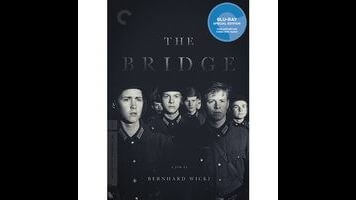That’s not to say that The Bridge is in the same league as Lewis Milestone’s classic. Directed by Bernhard Wicki (whose work here so impressed Hollywood that Darryl Zanuck hired him to shoot the German-language portions of 1962’s The Longest Day), the film meanders its way through an initial hour meant to establish the ordinary lives of seven high-school classmates, all roughly 16 years old. As the boys go about their day, dealing with parental strife and tentative teen romance and so forth, they excitedly discuss rumors that American tanks may roll in at any moment, and are elated when they all suddenly receive draft notices. After just a single day of training, however, they’re ordered to guard a local bridge, unaware that they’ve been parked there primarily to keep them out of the way, and that the bridge will soon be deliberately blown up in order to protect the town’s civilian population. When their commanding officer (Günter Pfitzmann) is killed while out looking for the detonation squad, all hell breaks loose.
In the source novel—a fictionalized memoir by Gregor Dorfmeister, who published it under the pseudonym Manfred Gregor—what happens before the boys are drafted is related via intermittent flashbacks. The movie, by contrast, tells the story chronologically, which means that it’s half over before anyone even dons a uniform. That wouldn’t be a problem were the everyday material sufficiently compelling on its own, rather than just serving as counterpoint to the impending mayhem, but most of the conflicts are too banal to warrant the amount of attention they receive. For example, Karl (Karl Michael Balzer) harbors a crush on a woman who works in the family beauty salon, only to be genuinely crushed when he discovers that she’s sleeping with his dad; while this happens, it’s never developed in any way, just offered as one of several anxieties that will soon seem petty and meaningless. Worse, even after a full hour, it’s still hard to distinguish the seven main characters. Only the smallest (and apparently youngest), Sigi (Günther Hoffmann), really stands out, and that’s mostly because the others tease him mercilessly.
This all becomes nearly irrelevant, however, once The Bridge finally reaches the bridge. Its last 45 minutes constitute a single sustained, relentlessly intense battle sequence, as the clueless septet valiantly tries to defend a structure that their own side wants destroyed. Much of the action takes place in the middle of the night (bleeding into the following morning), and Wicki’s choice to shoot in black-and-white highlights the eerie sense of isolation the boys feel, even though the bridge is one they know well, as they all live right nearby. (One of them even winds up taking a sniper position in their childhood treehouse.) There’s little doubt that things will go spectacularly badly, given the group’s immaturity, lack of training, and total ignorance about the true objective of their mission—in real life, only Dorfmeister survived, and only because he fled—but the details are riveting in their senseless absurdity. Which makes it all the more haunting when The Bridge concludes with a sadly stark eulogy: “This happened on April 27, 1945. It was so insignificant that it wasn’t mentioned in any military communiqué.” Thanks to this film, people remember.


 Keep scrolling for more great stories from A.V. Club.
Keep scrolling for more great stories from A.V. Club.